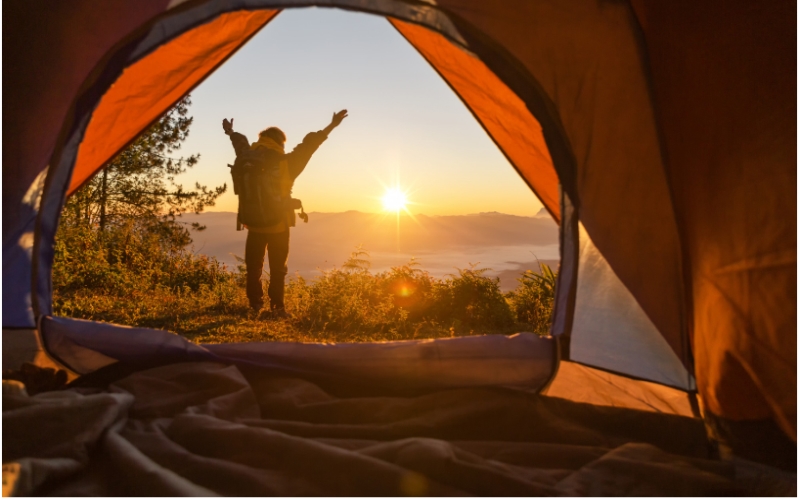Camping is one of the most enjoyable and rejuvenating activities that allow people to connect with nature. Whether you are a seasoned camper or a beginner, the key to a successful camping trip is having the right equipment. With so many options available, it can be challenging to determine what is essential. This article explores the most important equipment for camping, providing guidance on what you need to ensure a safe, comfortable, and memorable outdoor adventure.
1. Shelter and Sleeping Gear
A reliable shelter is fundamental to any camping experience. The most common type of shelter is a tent, which comes in various sizes and styles to suit different needs. When choosing a tent, consider the number of people in your group, the weather conditions, and the terrain where you will be camping. A good tent should be waterproof, sturdy, and easy to set up.
In addition to the tent, you’ll need sleeping gear to ensure a good night’s sleep. A sleeping bag is a must-have item, and it’s important to select one that is appropriate for the season and temperature range you’ll be camping in. Sleeping pads or air mattresses add an extra layer of comfort and insulation from the ground, making your sleeping experience more pleasant.
2. Cooking Equipment and Utensils
Camping often involves cooking outdoors, which can be a fun and rewarding experience if you have the right equipment. A portable camping stove is an essential item, allowing you to cook meals without relying on open fires. There are various types of camping stoves, from simple single-burner models to more elaborate multi-burner setups. Choose one that suits your cooking needs and the size of your group.
Don’t forget cooking utensils, pots, pans, and other essentials like a cooler for storing perishable food items. Utensils should be lightweight and durable, with materials like stainless steel or aluminum being popular choices. Additionally, a good-quality cooler is crucial for keeping food and drinks cold during your trip. An automatic knife can be a handy tool in your outdoor kitchen setup, offering quick access for slicing vegetables or opening packaging with ease.
3. Lighting and Navigation Tools
Adequate lighting is crucial for a safe camping experience, especially when it gets dark at night. Headlamps, lanterns, or flashlights are essential items for navigating your campsite and performing tasks in low-light conditions. Headlamps are particularly useful because they allow you to keep your hands free while providing a focused beam of light.
Navigation tools, such as a compass and a map, are also vital for campers, especially if you plan to hike or explore unfamiliar terrain. While GPS devices and smartphone apps offer advanced navigation capabilities, it’s always good to have traditional tools as backups in case of technology failure or lack of signal.
4. Safety and First Aid Supplies
Safety should always be a top priority when camping. A well-stocked first aid kit is an absolute necessity. It should contain basic items like bandages, antiseptic wipes, pain relievers, and other essential medical supplies. Additionally, consider including more specialized items depending on your camping location and activities, such as insect repellent, blister pads, and antihistamines.
Fire safety is another important aspect of camping. Ensure you have a fire extinguisher, a fire blanket, or a fire-resistant container for safe campfire management. Understanding the rules and regulations regarding campfires in your area is also crucial to avoid accidents and environmental damage.
5. Clothing and Personal Items
Packing appropriate clothing is essential for staying comfortable and protected during your camping trip. The key to dressing for camping is layering, which allows you to adjust your clothing based on the weather and activity level. Bring moisture-wicking base layers, insulating mid-layers, and a waterproof outer layer to stay dry in case of rain.
Personal items like toiletries, sunscreen, and insect repellent are also critical for your comfort and well-being. Don’t forget a sturdy pair of hiking boots or shoes, as well as extra socks and gloves for added warmth. A hat and sunglasses can help protect you from the sun, while a multi-tool or Swiss Army knife can be handy for various tasks around the campsite.
Camping is an enriching experience that can be made even better with the right equipment. By focusing on key essentials such as shelter, sleeping gear, cooking equipment, lighting, safety supplies, and appropriate clothing, you can ensure a comfortable and enjoyable trip. Remember to plan ahead, consider the specific needs of your group, and always prioritize safety. With the right equipment and preparation, your camping adventure will be a memorable journey into the great outdoors.


